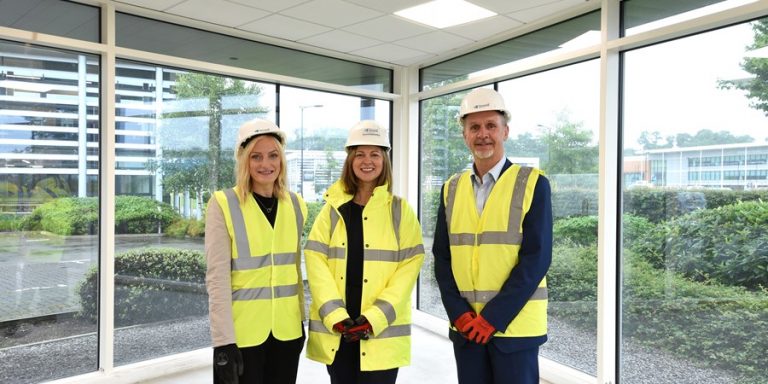Yorkshire Building Society names new Non-Exec Director
Architect trusted with board role
An architect from York has been appointed to York Civic Trust’s board of trustees. The organisation helps safeguard the city’s heritage buildings and historic monuments.
Matt Seddon is an associate director at Brewster Bye Architects in Leeds, where he has worked for almost 20 years. His architecture work includes the acclaimed restoration of the historically important crescent at St Leonard’s Place in York city centre, which has been transformed back into grand houses and apartments.
Matt said: “The York Civic Trust is a membership organisation that is run by volunteers for the benefit of everyone who lives, works and visits the city.
“As well as owning and running Fairfax House, which is an impressive Georgian town house dating back to the 1760s in the centre of York that is open to the public, the trust is involved with several restoration projects throughout the city. It also provides the City of York Council with crucial planning reports and recommendations.
“My role will be to provide a contemporary viewpoint and insight into the most recent planning rules and regulations when reviewing policy documents and creating planning reports for the Local Authorities and Council on behalf of the trust.
“I will also help the board of trustees to review and consider new uses for the historic buildings it is responsible for. It’s a fascinating role that will allow me to play a part in the protection of some of the city’s most interesting and historic buildings.”
York Civic Trust also works with local primary and secondary schools across the city as well as the University of York to educate pupils and students about the importance of York’s history and architecture. It is responsible for awarding and erecting the famous blue plaques seen on many buildings across the city.
Plans submitted for phase one of Attercliffe Waterside scheme
BRM welcomes new senior associate
More than half residential landlords prefer selling up to energy efficiency upgrade work
Exploring the future of digital construction: an insight into #Dcw2023
 Technologies
Amongst the array of talks across the various stages, the new asset management stage had an inspiring session on the restoration and renewal of the Palace of Westminster, thought to be the biggest restoration challenge the UK industry has seen!
The presentation showcased the power of available technology today, and how it can be leveraged for one of the UK’s most complex historic building renovations, demonstrated through:
Retrospectively creating a fully operational physical asset; recreating a detailed Revit model from 10,000+ scans, with integration, and analysis of data from sensors or other sources to monitor and optimise the performance of an asset.
Optimising geometry for real-time interrogation; Revit models comprising only of data rich components to aid decision making, whilst utilising the point cloud data as the backdrop to aid locating and navigation.
Enhancing internal spaces; utilisation of machine learning to turn 2D images into 3D models.
Engaging stakeholders; creating interactive digital environments to improve understanding of a building, aid decision making, and rehearse construction scenarios.
Digitalised Construction Industry
It is extremely clear that ‘Building Safety’ is a driver for a digitalised construction industry, with standardised product information being key to minimise risk, but how do we move to this?
A panel discussion, chaired by Dame Judith Hackitt, with representatives from across the construction process highlighted the mammoth task of sifting through existing product data so that only useful data is shared with the supply chain.
As a result, with the designers having all the data available to them about a product from the manufacturer, they would be able to make the decision and select the right product, meaning the industry could see what is being designed as actually what is being built.
Technologies
Amongst the array of talks across the various stages, the new asset management stage had an inspiring session on the restoration and renewal of the Palace of Westminster, thought to be the biggest restoration challenge the UK industry has seen!
The presentation showcased the power of available technology today, and how it can be leveraged for one of the UK’s most complex historic building renovations, demonstrated through:
Retrospectively creating a fully operational physical asset; recreating a detailed Revit model from 10,000+ scans, with integration, and analysis of data from sensors or other sources to monitor and optimise the performance of an asset.
Optimising geometry for real-time interrogation; Revit models comprising only of data rich components to aid decision making, whilst utilising the point cloud data as the backdrop to aid locating and navigation.
Enhancing internal spaces; utilisation of machine learning to turn 2D images into 3D models.
Engaging stakeholders; creating interactive digital environments to improve understanding of a building, aid decision making, and rehearse construction scenarios.
Digitalised Construction Industry
It is extremely clear that ‘Building Safety’ is a driver for a digitalised construction industry, with standardised product information being key to minimise risk, but how do we move to this?
A panel discussion, chaired by Dame Judith Hackitt, with representatives from across the construction process highlighted the mammoth task of sifting through existing product data so that only useful data is shared with the supply chain.
As a result, with the designers having all the data available to them about a product from the manufacturer, they would be able to make the decision and select the right product, meaning the industry could see what is being designed as actually what is being built.
 Final Thoughts
Veronica concluded: “One of my key takeaways from the day, is that the industry plays a pivotal role in the safety of occupants, and the Building Safety Act 2022 ensures tragedies, such as Grenfell, do not happen again.
“In addition to this, and as discussed in one of the sessions ‘The Golden Thread to ESG: The Built Environment’s Opportunity & Calling’, what we at Waldeck, other consultants across the industry and our clients must now do is take this opportunity to look at environmental and social considerations in design that impact occupants directly or indirectly, such as energy efficiency, adoption of renewable energy sources and public spaces to name a few, going some way to meet the UK’s sustainability targets.”
Final Thoughts
Veronica concluded: “One of my key takeaways from the day, is that the industry plays a pivotal role in the safety of occupants, and the Building Safety Act 2022 ensures tragedies, such as Grenfell, do not happen again.
“In addition to this, and as discussed in one of the sessions ‘The Golden Thread to ESG: The Built Environment’s Opportunity & Calling’, what we at Waldeck, other consultants across the industry and our clients must now do is take this opportunity to look at environmental and social considerations in design that impact occupants directly or indirectly, such as energy efficiency, adoption of renewable energy sources and public spaces to name a few, going some way to meet the UK’s sustainability targets.” Housebuilder creates Partnership Division to increase affordable homes provision
Josh earns promotion to Associate Director with Wright Vigar
Funds released to spur on technical developments in agriculture
“The success of the previous competition rounds and the broad scope of ideas coming forward showcase the range of possibilities available for driving up productivity and solving some of the industry’s biggest challenges. I encourage everyone to take a look at what’s on offer in the latest competitions and apply.”
Defra has published guidance for the third round of the Small R&D Partnerships competition, seeking to help businesses develop a new farming product or service and take it to commercialisation on the open market. Worth almost £10million, it has been developed in partnership with the Transforming Food Production Challenge and is delivered by Innovate UK. The second round of the competition has already funded projects including exploring how to breed sheep with a naturally low carbon footprint to help sheep farmers contribute to the journey towards net zero, and a project combining generation of electricity with growing berries to power operational processes such as automated picking, sensors and vehicles. It comes alongside new guidance for a £4.5million Feasibility Studies competition which aims to support businesses and researchers through the difficult testing phase of an idea, checking whether it works in practice and helping them assess whether to invest in a project. It looks for early-stage solutions that have the potential to substantially improve the overall productivity, sustainability and resilience of farming, and move existing agricultural sectors to net zero. Successful applicants in previous rounds include a study to identify fungal strains that can help fight against insect and fungal pests in wheat crops, reducing the costs associated with multiple applications of chemical pesticides, mechanical damage from repeated spray applications and crop yield losses. Farmers, growers, foresters, research organisations and businesses are encouraged to read the guidance ahead of applications opening. Applications for the Small R&D Partnerships competition open next week, and the Feasibility Studies competition window is open from 18 September. Dr Katrina Hayter, Executive Director for the Healthy Living and Agriculture Domain at Innovate UK, said: “We look forward to supporting the next round of applicants and identifying promising partnerships that hold the potential to address the sustainability, efficiency, and net zero challenges confronting the UK’s agrifood industry. “Feasibility studies mark the initial stage in researching an idea that could improve farming, while small R&D partnerships are a vital step to empowering businesses to forge novel farming products and services, paving the way towards successful commercialisation.“By fostering collaborations between farmers, growers, agri-businesses and researchers, these partnerships become the driving force behind transforming innovative solutions into practical applications.”
Sewell Group moves two consultancy businesses to Bridgehead Business Park
Sewell Group has invested in a new office building on Hessle’s Bridgehead Business Park as the business continues to expand.
The 9,500 square foot office, formerly occupied by Beal Homes, will house two of the company’s consultancy businesses, Shared Agenda and data intelligence firm Parallel. Previously based at offices in Willerby, the companies are experiencing a growth in local, regional and national clients and have outgrown their current space. The offices will also be used to provide extra hot desking space for the wider Sewell team. The location of the business park, with easy access to the motorway network, means the companies are well placed to serve their expanding client base across the north, and liaise easily with sister consultancy company Community Ventures, which has offices in Leeds, Stockton-on-Tees and Nottingham. Jo Barnes, MD of Sewell Estates, said: “Being a business that was established in East Yorkshire in 1876, it was important for us to keep our local roots as we expand. Professional services have been under-represented in the area for some time, so we are keen to invest further in developing talent within the region and attracting people from across the country. Whilst our Group will continue to have its headquarters on Leads Road in Hull, this new office base will help us to respond to our recent growth. “Our team are really excited about the move, as it will give them a better working environment, more space, and extra facilities to help make their working day run more smoothly. It’s important to ensure an attractive workspace that enables modern, collaborative working methods for our teams and our customers. As a part employee-owned business, we are investing in our future, as our ownership model enables us to take a much longer-term view than some other companies.” “Refurbishment of an already built facility, rather than reverting to a new-build, was also important for us as part of our journey to sustainability. Our construction team at Sewell Construction are skilled in transforming existing spaces and making them more sustainable. The upgrade of the building, with the installation of solar panels and more energy efficient systems, alongside a complete refurbishment designed by our team, brings together our in-house skills. I’m delighted with the emerging results and we expect to move into the property in September.” Bridgehead Business Park is a 612,000 square foot business development on the outskirts of Hull.











